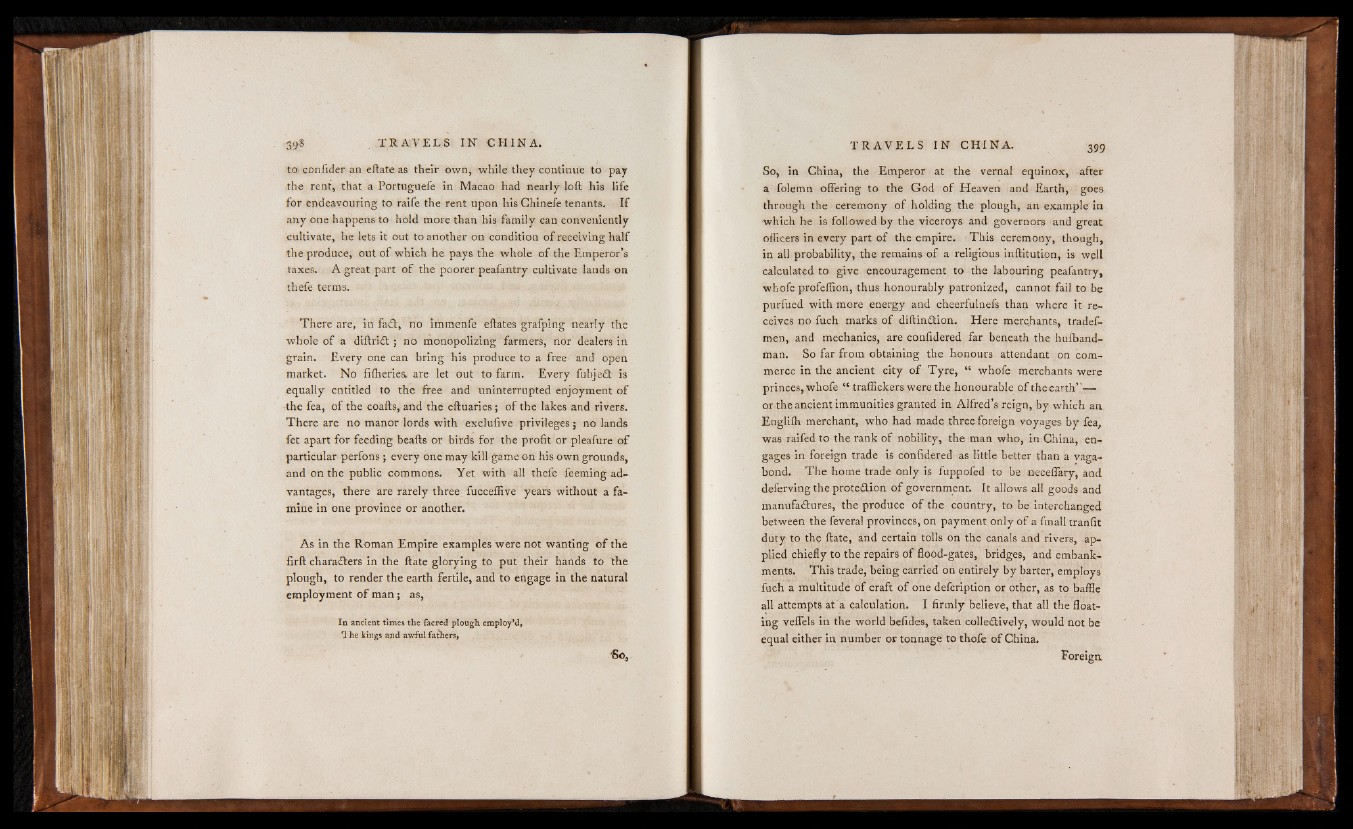
to confider an eftate as their own, while they continue to pay
the rent, that a Portuguefe in Macao had nearly loft his life
for endeavouring to raife the rent upon his Chinefe tenants. I f
any one happens to hold more than his family can conveniently
cultivate, he lets it out to another on condition o f receiving half
the produce, out o f which he pays the whole o f the Emperor’s
taxes. A great part o f the poorer peafantry cultivate lands on
thefe terms.
There are, in fa£t, no immenfe eftates grafping nearly the
whole o f a diftriCt ; no monopolizing farmers, nor dealers in
grain. Every one can bring his produce to a free and open
market. No fiiheries. are let out to farm. Every fubjeCt is
equally entitled to the free and uninterrupted enjoyment o f
the fea, o f the coafts, and the eftuaries ; o f the lakes and rivers.
There are no manor lords with exclulive privileges; no lands
fet apart for feeding beafts or birds for the profit or pleafure o f
particular perfons ; every one may kill game on his own grounds,
and on the public commons. Yet with all thefe feeming advantages,
there are rarely three fucceffive years without a famine
in one province or another.
As in the Roman Empire examples were not wanting o f the
firft characters in the ftate glorying to put their hands to the
plough, to render the earth fertile, and to engage in the natural
employment o f m an; as,
In ancient times the facred plough employ’d,
'I he Icings and awful fathers,
So, in China, the Emperor at the vernal equinox, after
a folemn offering to the God o f Heaven and Earth, goes
through the ceremony o f holding the plough, an example in
which he is followed by the viceroys and governors and great
officers in every part o f the empire. This ceremony, though,
in all probability, the remains o f a religious inftitution, is well
calculated to give encouragement to the labouring peafantry,
whofe profeffion, thus honourably patronized, cannot fail to be
purfued with more energy and cheerfulnefs than where it receives
no fuch marks o f diftinCtion. Here merchants, tradef-
men, and mechanics, are confidered far beneath the hufband-
man. So far from obtaining the honours attendant on commerce
in the ancient city o f T y re , “ whofe merchants were
princes, whofe “ traffickers were the honourable o f the earth”—
or the ancient immunities granted in Alfred’s reign, by which an
Engliffi merchant, who had made three foreign voyages by fea,
was raifed to the rank o f nobility, the man who, in China, engages
in foreign trade is confidered as little better than a vagabond.
The home trade only is fuppofed to be neceffary, and
deferving the protection o f government. It allows all goods and
manufactures, the produce o f the country, to be interchanged
between the feveral provinces, on payment only o f a fmall tranfit
duty to the ftate, and certain tolls on the canals and rivers, applied
chiefly to the repairs o f flood-gates, bridges, and embankments.
This trade, being carried on entirely by barter, employs
fuch a multitude o f craft o f one defcription or other, as to baffle
all attempts at a calculation. I firmly believe, that all the floating
veffels in the world befides, taken collectively, would not be
equal either in number or tonnage to thofe o f China.
Foreign